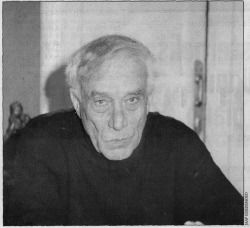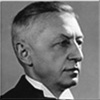“Sumrak nochi” around the creator, or the game of “enkavidimki”

M. Rashkovskaia
It was not a long time ago that the fund of Boris Pasternak in Russian State Archive of Literature and Art (RGALI) was replenished with several documents that bear direct relation to the life of the poet, even though they are dated 2010–2011.
Elena Vladimirovna Pasternak presented our archive with the correspondence between Evgenii Borisovich Pasternak and the Department of Registration and Archive Funds of the Federal Security Service of the Russian Federation (FSB) concerning possible presence of B. L. Pasternak’s letters, at a certain moment inspected and detained by the post office, in the FSB archive.
This correspondence consists of 6 documents: three authentic letters from the Head of Department of Registration and Archive Funds of FSB and enclosed archive note with an report “ob unichtozhenii dokumentov, iz’’iatykh pri obyske v avguste 1960 g., na osnovanii zakliucheniia Sledstvennogo otdela KGB pri SM SSSR ot 1 noiabria 1960”, E. B. Pasternak’s letters to the director of FSB A. V. Bortnikov and the Head of Department of Registration and Archive Funds of FSB (printed copies). Unfortunately, the very first Evgenii Borisovich’s letter from November 2, 2010 has not survived, although its contents are easily restored from V. S. Khristoforov’s letter from December 2, 2010. This correspondence is published below.
1 A few words have to be said about the last, fifth inventory of the poet’s fund in RGALI. It includes the documents from the research archive of Elena Vladimirovna and Evgenii Borisovich, which can be used to follow practically all history of studies in Pasternak’s creative legacy, not only in his homeland, but also worldwide. The communication between Russian and foreign researchers of Pasternak was centred on Evgenii Borisovich and Elena Vladimirovna. Here are collected not only research into the poet, but also memories about him, diary notes, poems in his memory, translations, correspondence of scholars with Evgenii Borisovich and Elena Vladimirovna during more than 40 years since B. Pasternak’s decease. The documents stored in this inventory represent not only auxiliary materials for future researchers, but also a memorial to his son’s heroic deed. The documents described have the following reference number: RGALI. F. 379. Op. 5. Ed. khr. 882a.
2 The text of Evgenii Borisovich’s letter from November 2, 2010 has been lost by the correspondent himself.
3 These documents composed the third inventory of B. L. Pasternak’s fund in RGALI.
4 Below is the text that the correspondent refers to: “9 avgusta sego goda Pasternak otpravil pis’mo nekoemu Reznikovu Daniilu Georgievichu, prozhivaiushchemu v Parizhe, v kotorom vyrazhaet svoi somneniia v vozmozhnosti uvidet’ “Doktora Zhivago” opublikovannym v SSSR. “Ia prekrasno ponimaiu, chto seichas <roman> ne mozhet byt’ opublikovan i, navernoe, budet opublikovan ne skoro, mozhet byt’, nikogda – s takoi bol’shoi i neprivychnoi svobodoi dukha v nem otrazhena zhizn’, zhizn’ vo vsei polnote, zhizn’ v mire; nastol’ko svobodno i novo samo ponimanie mira”. Otnositel’no peredachi romana za granitsu Pasternak pishet Reznikovu: “Teper’ menia zdes’ rasterzaiut zazhivo: u menia uzhe seichas est’ takoe predchuvstvie, i Vy vdali budete svidetelem etogo”. Odnovremenno Pasternak napravliaet Reznikovu rukopis’ ocherka “Liudi i polozheniia”, napisannogo im v kachestve predisloviia k sborniku stikhotvorenii, izdannykh Goslitizdatom (the collection was never published. – M. R.). Pri etom on prosit Reznikova raspolagat’ etim ocherkom po svoemu usmotreniiu, kak esli by ona byla ego sobstvennoi”.
5 Here are some extracts from this text: “<…> V avguste 1957 goda Pasternak v pis’me k svoei sestre Sleiter soobshchal: “Ia ne znaiu, vo chto eto vyl’etsia (rech’ shla o reaktsii na izdanie romana za granitsei) i chem konchitsia, no k chemu by ono ni privelo, dazhe k samomu khudshemu, eto slishkom slabaia rasplata za to, chto veshch’ napisana i chto nichto ne mozhet pomeshat’ ei zaniat’ svoe mesto v zhizni veka”.<…> <…> Nekto Suvchinskii P.P., zanimaiushchiisia izucheniem i populiarizatsiei tvorchestva Pasternaka vo Frantsii, pisal poslednemu v iiule 1958 goda, chto v ochen’ korotkoe vremia imia Pasternaka udalos’ postavit’ vo Frantsii na tu vysshuiu stupen’ priznaniia, kotoroi on dostoin, i tem samym iakoby ispravlena odna iz velichaishikh nespravedlivostei russkoi istorii. V otvet na eto pis’mo Pasternak pisal: “Naprasno vy dumaete, chto ia chem-to byl do romana. Ia nachinaius’ tol’ko s etoi knigi, vse, chto bylo prezhde, – chepukha”.<…> <…> kak eto ustanovleno v khode kontrolia za korrespondentsiei Pasternaka, on pytalsia otpravit’ za granitsu riad pisem, v kotorykh podtverzhdal svoe udovletvorenie prisvoeniem emu Nobelevskoi premii, i upolnomochival poluchit’ ee svoiu znakomuiu grafiniu de Pruaiiar, prozhivaiushchuiu vo Frantsii. V pis’makh k mnogochislennym zarubezhnym korrespondentam Pasternak postoianno podcherkivaet, chto iakoby “sravnitel’no miagkie mery” po otnosheniiu k nemu iavliaiutsia rezul’tatom podniatoi kampanii na Zapade; zaiavliaet o tiazhelykh usloviiakh izoliatsii ego ot obshchestva, iakoby spetsial’no organizuemoi, o tom, chto ego khotiat iakoby okonchatel’no unichtozhit’ razlichnymi putiami vplot’ do material’nykh ushchemlenii. Tak, v pis’me ot 3 ianvaria 1959 goda nekoemu Maku Gregoru Pasternak pisal: “Ia naprasno ozhidal proiavleniia velikodushiia i sniskhozhdeniia v otvet na dva moikh opublikovannykh pis’ma. Velikodushie i terpimost’ ne v prirode moikh adresatov, oskorblenie i unizhenie budut prodolzhat’sia. Petlia neiasnosti, kotoraia vse bol’she i bol’she zatiagivaetsia vokrug moei shei, imeet tsel’iu siloi postavit’ menia v material’nom otnoshenii na koleni, no etogo nikogda ne budet. Ia perestupil porog novogo goda s samoubiistvennym nastroeniem i gnevom””.
6 Apparently, the descriptions from this report can not reveal which exactly documents connected with Pasternak were destroyed; still, some can be commented on.
7 Correspondence by J. Dono Digeli “U Borisa Pasternaka v Peredelkine” (1957).
8 V. D. Dudintsev’s novel “Ne khlebom edinym” published in “Novyi mir” evoked severe criticism as ideologically vicious and slanderous, the one perverting soviet realities. K. G. Paustovskii’s speech, where he vindicated it truthfulness and actuality in the spirit of 20th KPSS convention, leaked out and made its way to samizdat.
9 Here, as well as in №№ 16 and 17, what is meant is not the name of the edition, but rather the places of appearance.
10 Pasternak was getting on well with Georgii Leonidze and translated poems from 1933 to 1959. It is his last translations that may have been destroyed on Lubianka.
11 This is most probably about M. A. Voloshin’s poem “Severo-vostok” (1920), which was never published during the soviet times.
12 The third inventory of Pasternak’s fund contains his translations of letters addressed to him from foreign editors (ed. khr. 91). This probably refers to similar translations.
13 This was the name of the anthology of Ukrainian poetry and prose of 1917–1933 compiled by a man of letters Iu. A. Lavrinenko.
14 This might have been a letter from one of Pasternak’s correspondents, a puppet-maker from Hamburg, who Boris Leonidovich supported financially.
15 Even not being able to identify all destroyed documents, we can make some conclusions about their contents. This note included two types of documents confiscated during the search of O. V. Ivinskaia’s apartment. The first and most important thing that is related to Pasternak is the articles and reviews made by foreign writers and journalists about the novel and the situation around Pasternak after its publishing and the Nobel Prize awarded to the author, as well as his personal correspondence with his nearest people on printing the novel with Feltrinelli and other publishers. Apart from that there are widely-spread samizdat texts that are not connected with Pasternak. We are very unlikely to find out what exactly is meant by “statement by Feltrnelli” (2), “kopiroval’naia bumaga chernogo tsveta, nachinaiushchaiasia slovami “Uv. Sin’or Fel’trinelli” (36), razlichnaia perepiska – na 339 l. (61)”, “pis’ma razlichnykh lits” (76), “pis’mo iz Pragi” (72), “pis’mo na inostrannom iazyke sinimi chernilami” (74) and many other things.
16 The trial of O. V. Ivinskaia and I. I. Emel’ianova took place on December 6, 1961. But according to the Code of criminal procedure of the RSFSR, the documents that were not related to the case could be returned to the defendant’s family before trial.
17 Quoted by: Pasternak B. L. Polnoe sobranie sochinenii. T. IX. S. 454.
This was the end of Evgenii Borisovich’s attempt to find out the fate of the missing letters of Boris Pasternak. To illustrate this correspondence, I would like to cite a fragment from Pasternak’s letter to his old friend Sergei Nikolaevich Durylin, dated March 24m 1946. These several words were written after the page with a gift inscription from the “Zemnoi prostor” collection, sent to Durylin by post, got missing: “Pustiakovaia nadpis’, ne stoiashchaia vosstanovleniia. No stranno, ne pravda li? Veroiatno “enkavidimka”, kak govarival pokoinyi B. Kornilov”.
























